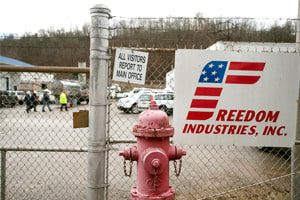
MCHM, the toxic chemical that contaminated the drinking water for some 300,000 residents in West Virginia, was not the only substance that leaked into Elk River on January 9th. According to state officials, a chemical called PPH was also present in the above ground storage tank that leaked. Freedom President Gary Southern wrote that the […]
 MCHM, the toxic chemical that contaminated the drinking water for some 300,000 residents in West Virginia, was not the only substance that leaked into Elk River on January 9th. According to state officials, a chemical called PPH was also present in the above ground storage tank that leaked. Freedom President Gary Southern wrote that the tank contained about 88.5 percent MCHM, 7.3 percent PPH, and the rest water.
MCHM, the toxic chemical that contaminated the drinking water for some 300,000 residents in West Virginia, was not the only substance that leaked into Elk River on January 9th. According to state officials, a chemical called PPH was also present in the above ground storage tank that leaked. Freedom President Gary Southern wrote that the tank contained about 88.5 percent MCHM, 7.3 percent PPH, and the rest water.
According to the Department of Environmental Protection, failing to accurately report the identity and quantity of substances in the tank was a violation of state code. Despite an order to immediately disclose what was in the tank, Freedom waited 12 days before mentioning that PPH was also present. The company filed for Chapter 11 bankruptcy last week.
Governor Earl Ray Tomblin said he was “very disappointed” by how long Freedom waited to disclose the information. He pointed out in a news conference that “You know, once again it’s another one of those chemicals that very few people knew anything about,” MCHM is known to cause vomiting, skin irritation, diarrhea and other health problems upon exposure, but little is known about its long-term health effects.
A state of emergency was declared with a day of discovering the spill. Residents in nine counties were told to not use the tap water for anything but flushing the toilet. Even after the ban was lifted, many experts and residents were skeptical to trust the safety of the water, especially when pregnant women were advised against doing so.
The chemical spill has highlighted a number of regulatory gaps that could have contributed to the catastrophe. Since the tank was an above ground storage unit, the EPA had little control over its activity. An inspector had not even been to the spill site since 1991. Further investigation found plans that named the tank as being a questionable artefact, but the facility had changed plans since then and nobody had bothered to take action. Several years ago, the state ignored a federal agency who advised them to employ stricter regulations following the death of workers who died in a chemical accident.
Residents and business owners are seeking legal action over the water contamination. Parker Waichman LLP, a national personal injury law firm, has filed two class action lawsuits on behalf of residents and businesses, and is offering free legal advice to those affected by the spill.


